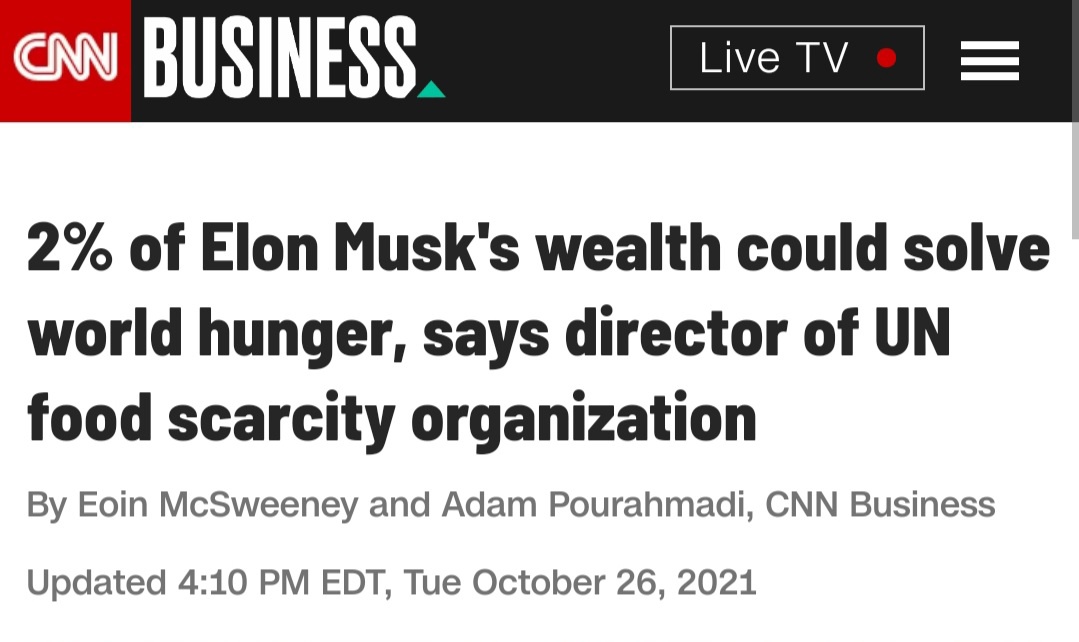World hunger is a major issue. Let's say you have a youngster who is poor. Hunger may be an everyday occurrence. When it becomes endemic, it has an impact on their learning, growth, and development. It has an impact on their schooling, and without it, they would be forced to low-paying jobs. This cycle may be vicious since their children may be subjected to the same problems. And, given that 10% of the world's population still lives in severe poverty, it's a massive issue.
Before the epidemic, 2 billion people were already experiencing severe food insecurity. Following the epidemic, between 83 and 132 million persons were added to the list. However, a tiny group of individuals were enjoying the time of their lives elsewhere. Between March 2020 and October 2021, the wealth of billionaires in the United States increased by 70%. From $3 trillion to $5 trillion by March 2020.
So you'd think that with increased hunger on one hand and rising prosperity on the other, someone would point out the mismatch.
And they succeeded. In an interview, David Beasley, the executive director of the United Nations Global Food Programme (WFP), indicated that $6.6 billion might help battle world hunger – that $6.6 billion was merely 0.36 percent of the net worth of the top 400 US billionaires and a fraction of Elon Musk's net worth.
It was a hit with everyone. "If WFP can demonstrate on this Twitter thread precisely how $6B would eliminate global hunger, I will sell Tesla shares right now and do it," Elon Musk responded to a tweet "fact-checking" the $6.6 billion number.
And, thanks to Elon Musk's public challenge, the issue of global hunger has resurfaced - at least on Twitter. But first, let's get the facts right. Is it true that David Beasley said $6.6 billion could end world hunger?
No!
Instead, blame the uncertainty on CNN's deceptive title, which claimed that 2% of Elon Musk's riches could end global hunger. People would have known precisely what David Beasley stated if they had really opened the article and read it. He had to even tweet that the headline was incorrect. So, despite the hoopla surrounding the situation, a UN official did not make such remark.
How much money do we really need to "address" global hunger now that we've figured this out?
$330 billion, at least according to Ceres2030, which believes that with this amount of money, we could solve global hunger by 2030. Despite their confidence, there's no certainty that you'll be able to completely eliminate global hunger. Only half of the difficulty is procurement. You can make food more available by lowering costs or completely subsidising it, but you won't be able to end global hunger until you get this food to those who need it. The logistical constraints might be prohibitive in nations with inadequate government, corruption, and storage infrastructure.
India, for example, has a surplus of agricultural output every year, yet hundreds of thousands of people go hungry every day.
Furthermore, the expenditures continue to rise year after year. We've made significant progress in reducing global hunger since the 1970s. However, in the early 2000s, we saw a spike in hunger, owing in part to rising food costs. While several reasons contribute to this increase, such as gasoline prices and logistics expenses, there is one major issue that few people discuss: demand for meat and dairy products.
As wealth disparity spreads around the world, affluent nations' demand for meat and dairy products increases. While this isn't a concern in in of itself, keep in mind that this livestock eats a lot of grain, maize, and cereal. Food becomes more costly for the poor when numerous companies compete for the same produce.
To make a significant difference in this problem, governments would have to invest an additional $33 billion every year. And when you add it all up, it's easy to understand why even Elon Musk, the most amazing person on the planet, would not be able to cure global hunger.




Comments
Post a Comment